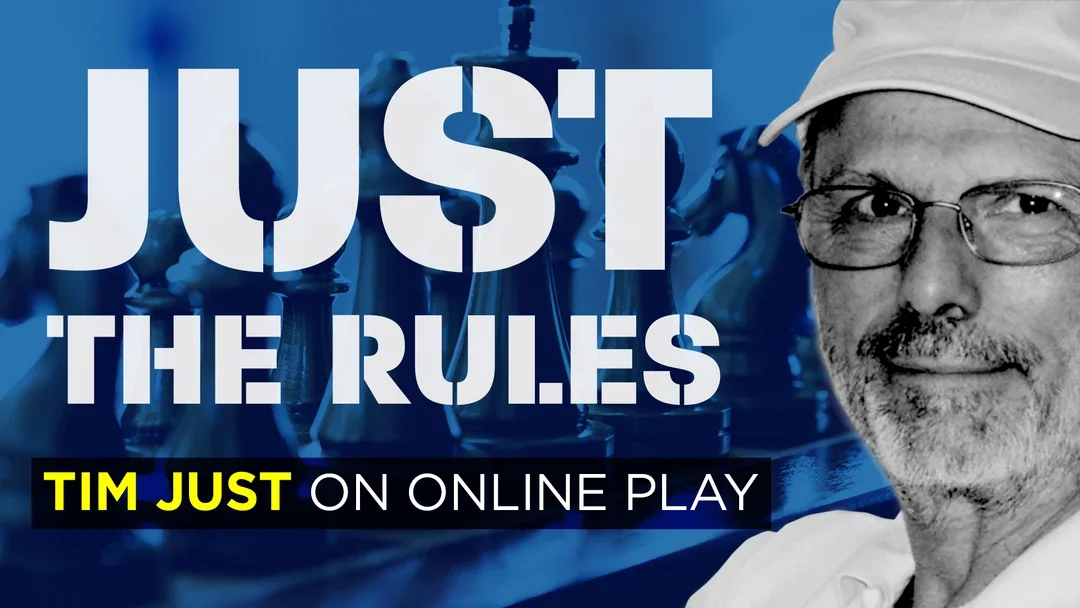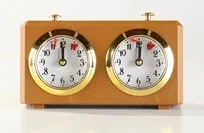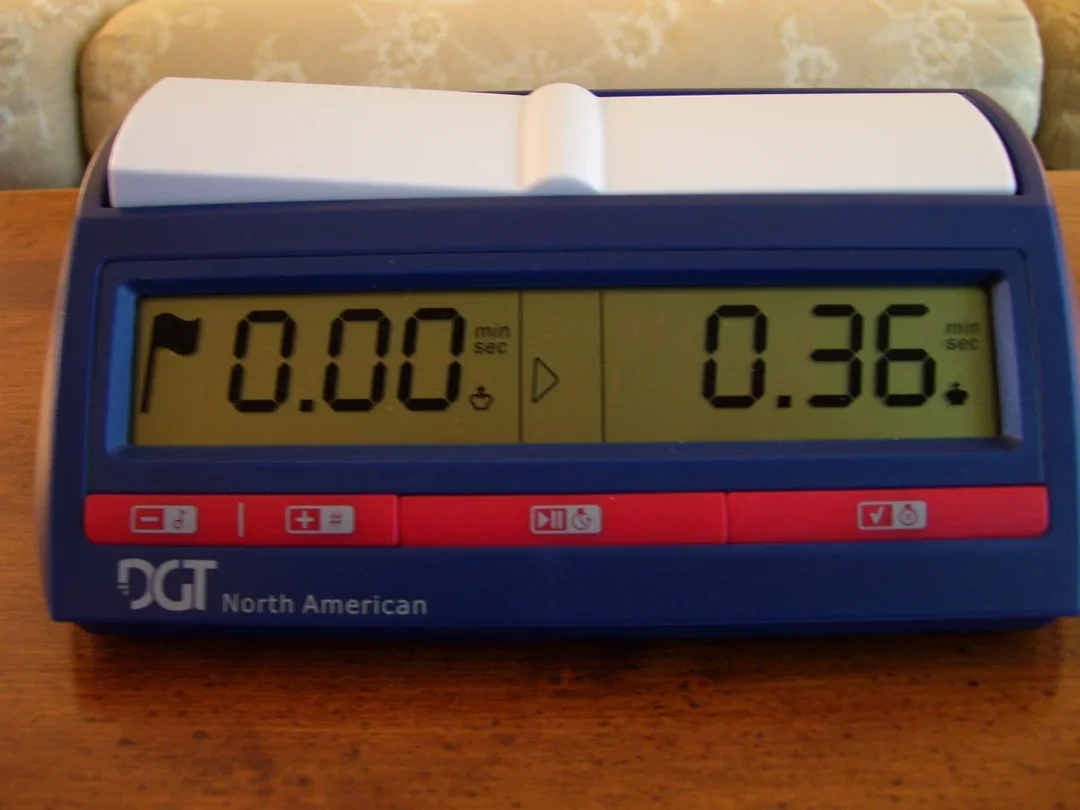
There is no tick in my tock!
Through a series of unforeseen circumstances, you leave your chess equipment at home—including your clock. But only half of the tournament’s wood pushers need a timer, right? So, no worries: you just assume to use your opponent’s clock. Your opponents have provided the clock in each of your other games, and you expect the same result here.
“Pairings are up,” shouts the TD! You see that your game is booked for board 39, and you get to lead the black chess army into battle. You pick up a scoresheet and fill in your opponent’s info—the standard stuff like name, rating, etc.
You are the first to arrive at the site of the upcoming game. When your adversary appears, you both go through the usual pleasantries, and then you fess up on your lack of a proper timer, asking: “How about we use your clock?”
Which draws the unexpected reply: “No, I don’t own a clock.”
Now what?

Scrounging?!
Getting a fellow chess player to loan out their clock is usually an easy task: just ask around. Most tournament chess players are good people. Finding a loaner clock typically works well in the early rounds, though the last round of the day can sometimes be a hassle. The lender may finish their game early and want their clock back, which turns into a messy situation all around. Some players avoid this hassle simply, by not being a clock loaner during the last round.
Additionally, borrowing a clock in the old days had an upside, as those analog wonders were generally easy to set and use. Today, however, digital timers are high-volume items at most events, and non-familiar models are not always easy to set. Borrowing a clock that is hard to use might work for the moment, but they might not prove worthwhile if they ever need to be reset, stopped or adjusted. And don’t expect the TDs to know how to work every model ever produced!
You and your opponent are having problems finding a usable clock or a generous donor. Time to ask the TD for some assistance.
So the Tournament Director says...
Your request to help locate a loaner clock could come with one of several different responses, and beware that all TDs and all events are different; there is nothing wrong with any of these replies:
1. Play your game without a clock.
2. I don’t have extra clocks, so loaning them out is not an option.
3. Yes, I have extra clocks that I can share with my players.
4. I used to loan out clocks, but the difficulty in getting them back is not worth it.
5. I have spare clocks. They are used only on boards without timers in the last five minutes of the final time control period. I slap a properly set one on those contests.
6. If I find a clock for you, I will place it on your game.
At scholastic tournaments, the first option is often the preferred choice for most TDs, because many of the games in lower sections finish well ahead of the scheduled round time. If a clock in a scholastic game is eventually needed near the end of the round, then the TD typically opts for choice number-five.
We don’t need a clock!
So you start your game without a clock and hope for the best. You normally play fast, and the clock has never been an issue in any of your previous games – though you are not sure about your opponent, who appears to be moving slower than a river of molasses.
Hooray! The TD found a loaner clock, and only 30 minutes have passed since the round started. The TD explains that the device is properly set for the event’s time control, and both players will have 15 minutes deducted from the base time control, which splits the elapsed round time equally between the two of you.
You protest! “I moved faster than my opponent and should get less time deducted from my clock!” But the TD has no way to prove how much time either player took to make the moves, so the correct play here is to split the elapsed time equally between both players.
And don't forget the final, most-important instruction from the TD: “Return that clock directly to me at the end of your game. I need to return it to its owner!”
Don’t go to a tournament without your chess clock!
And please know how to set and use it! They come with instructions – but that is another topic altogether.

The free, updated US Chess Rules (Chapters 1+2 + 10 +11 from the 7th edition rulebook) are now downloadable and available online. Past “Just the Rules” columns can be viewed here. Plus listen to Tim when he was a guest on the US Chess podcast “One Move at a Time.”
Tim Just is a National Tournament Director, FIDE National Arbiter, and editor of the 5th, 6th, and 7th editions of the US Chess Rulebook. He is also the author of My Opponent is Eating a Doughnut & Just Law, which are both available from US Chess Sales and Amazon/Kindle. Additionally, Tim recently revised The Guide To Scholastic Chess, a guide created to help teachers and scholastic organizers who wish to begin, improve, or strengthen their school chess program. Tim is also a member of the US Chess Rules Committee. His new column, exclusive to US Chess, “Just the Rules” will help clarify potentially confusing regulations.
Categories
Archives
- January 2026 (10)
- December 2025 (27)
- November 2025 (29)
- October 2025 (39)
- September 2025 (27)
- August 2025 (29)
- July 2025 (43)
- June 2025 (25)
- May 2025 (24)
- April 2025 (29)
- March 2025 (29)
- February 2025 (20)
- January 2025 (24)
- December 2024 (34)
- November 2024 (18)
- October 2024 (35)
- September 2024 (23)
- August 2024 (27)
- July 2024 (44)
- June 2024 (27)
- May 2024 (31)
- April 2024 (51)
- March 2024 (34)
- February 2024 (25)
- January 2024 (26)
- December 2023 (29)
- November 2023 (26)
- October 2023 (37)
- September 2023 (27)
- August 2023 (37)
- July 2023 (47)
- June 2023 (33)
- May 2023 (37)
- April 2023 (45)
- March 2023 (37)
- February 2023 (28)
- January 2023 (31)
- December 2022 (23)
- November 2022 (32)
- October 2022 (31)
- September 2022 (19)
- August 2022 (39)
- July 2022 (32)
- June 2022 (35)
- May 2022 (21)
- April 2022 (31)
- March 2022 (33)
- February 2022 (21)
- January 2022 (27)
- December 2021 (36)
- November 2021 (34)
- October 2021 (25)
- September 2021 (25)
- August 2021 (41)
- July 2021 (36)
- June 2021 (29)
- May 2021 (29)
- April 2021 (31)
- March 2021 (33)
- February 2021 (28)
- January 2021 (29)
- December 2020 (38)
- November 2020 (40)
- October 2020 (41)
- September 2020 (35)
- August 2020 (38)
- July 2020 (36)
- June 2020 (46)
- May 2020 (42)
- April 2020 (37)
- March 2020 (60)
- February 2020 (38)
- January 2020 (45)
- December 2019 (34)
- November 2019 (35)
- October 2019 (42)
- September 2019 (45)
- August 2019 (56)
- July 2019 (44)
- June 2019 (35)
- May 2019 (40)
- April 2019 (48)
- March 2019 (61)
- February 2019 (39)
- January 2019 (30)
- December 2018 (29)
- November 2018 (51)
- October 2018 (45)
- September 2018 (29)
- August 2018 (49)
- July 2018 (35)
- June 2018 (31)
- May 2018 (39)
- April 2018 (31)
- March 2018 (26)
- February 2018 (33)
- January 2018 (30)
- December 2017 (26)
- November 2017 (24)
- October 2017 (30)
- September 2017 (30)
- August 2017 (31)
- July 2017 (28)
- June 2017 (32)
- May 2017 (26)
- April 2017 (37)
- March 2017 (28)
- February 2017 (30)
- January 2017 (27)
- December 2016 (29)
- November 2016 (24)
- October 2016 (32)
- September 2016 (31)
- August 2016 (27)
- July 2016 (24)
- June 2016 (26)
- May 2016 (19)
- April 2016 (30)
- March 2016 (36)
- February 2016 (28)
- January 2016 (32)
- December 2015 (26)
- November 2015 (23)
- October 2015 (16)
- September 2015 (28)
- August 2015 (28)
- July 2015 (6)
- June 2015 (1)
- May 2015 (2)
- April 2015 (1)
- February 2015 (3)
- January 2015 (1)
- December 2014 (1)
- July 2010 (1)
- October 1991 (1)
- August 1989 (1)
- January 1988 (1)
- December 1983 (1)







